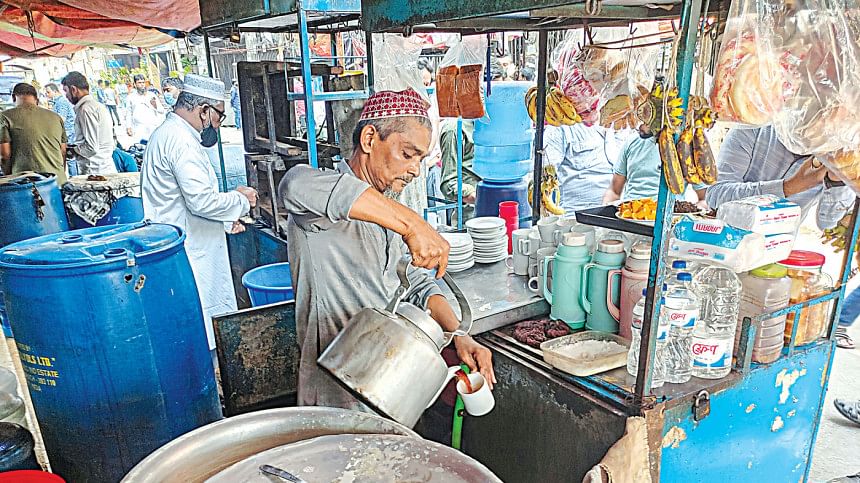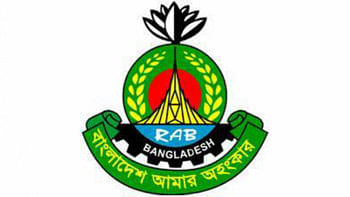Tea prices rise in Dhaka’s roadside stalls

Mohammad Dulal, a tea seller at Teacher-Student Centre (TSC) of the University of Dhaka, used to sell tea made of condensed milk for Tk 6 per cup a month ago. At present, he has increased the price to Tk 10.
Similarly, he used to sell a cup of tea without milk for Tk 5, but now the same drink costs Tk 6.
The price of tea has increased due to a rise in prices of its ingredients such as sugar, milk, tea leaves, kerosene, lemon and ginger.
Dulal has been selling tea at TSC for a decade.
"The prices of all kinds of ingredients have gone up. That's why I increased the prices," the tea seller said.
"A month ago, I used to buy a small tin of condensed milk for Tk 60 while it is now Tk 75. Half a kilogramme (kg) of tea leaves was earlier sold at Tk 150 while it is now Tk 155 to Tk 160."
"One kg of sugar used to be sold at Tk 75 while it is now Tk 90. One litre of kerosene was Tk 65 before but is now Tk 90. Ginger was Tk 60 per kg but is now Tk 120-150," Dulal said, adding that the cost of living has also gone up.
"It was difficult to run the household with the income that was earned by selling tea all day long," he said.
This journalist visited a number of crowded spots, including Mirpur, Kalyanpur, Kalabagan, Jigatola, Karwan Bazar and Motijheel, and witnessed that the price of milk tea has increased by Tk 4 to Tk 6 per cup and tea without milk by Tk 2 to Tk 3.
Tea has now become an integral part of social and professional life, making it the world's most-consumed beverage as it is also popular among low-income groups.
Rahmat Ali, a tea seller by the Insurance Development and Regulatory Authority's premises in Motijheel, said he used to sell a cup of milk tea for Tk 8 a month ago.
"Now I am selling it for Tk 12. That's why we have to hear a lot of harsh words from consumers daily," he said.
"The prices of all kinds of necessities have gone up. I also have to manage both the business and my family. In addition, there are many other costs involved in running a business," he said.
"The coronavirus crisis has not yet been fully overcome," Ali added.
Mahmud Abbas Siddique, owner of Abid Tea Stall at West Tejturi Bazar in Farmgate, has been running the stall for five years.
He did not raise the price of tea. Instead his business strategy to manage the cost is to reduce the volume of tea per cup.
"Common people have not been able to fully overcome the Covid-19 crisis yet. In the meantime, if the price of tea increases, people will substantially reduce the consumption of tea," he said.
Those who regularly drink tea in roadside stalls have reduced their consumption of tea, tea vendors said.
They said those who used to drink six to seven cups of tea in the past now limited themselves to four or five cups.
Tannin Islam, a resident of the capital, stays in the Karwan Bazar area for a big part of the day for professional reasons.
He used to drink six cups of tea daily and now has reduced it to four cups. He shared his experience with The Daily Star.
"The price of everything has gone up which affects my life like that of other people. It's becoming impossible to live with the money I get paid [from the employer]. So, I had to reduce tea consumption," he said.
"In the stall where I regularly drink tea, the price of a cup of milk tea used to be Tk 5 but it is now Tk 7," he added.
According to Business Insider Bangladesh, of all the tea consumed in the country, 45 per cent is at the household level while the rest is at tea stalls, restaurants and offices.
In Bangladesh, tea brands dominate the market with a 75 per cent share while non-branded producers account for the rest.
Azam J Chowdhury, chairman of The Consolidated Tea & Lands Company Bangladesh Limited (Finlay), told The Daily Star that tea production in Bangladesh was now at a historic high.
"There is no reason to increase the price of tea leaves," he said.
He added that if someone says that the price of tea leaves has gone up and that was why the price of tea has gone up, the Directorate of National Consumers Right Protection should take legal action.
SM Didarul Hasan, deputy general manager (marketing) of Ispahani Tea Limited, said the price of tea leaves has not increased.
The prices of other ingredients used in making tea have increased for a rise in their import alongside living costs of tea sellers. That is why the price of it as a whole has gone up.
"If prices increase in [tea] auction, the price of tea increases. Recently, the price of tea has not increased in the auctions. So we did not increase the price of tea," he said.
"Our sales are declining, we had been apprehending it [rise of prices of other ingredients]," Hasan added.

 For all latest news, follow The Daily Star's Google News channel.
For all latest news, follow The Daily Star's Google News channel. 



Comments